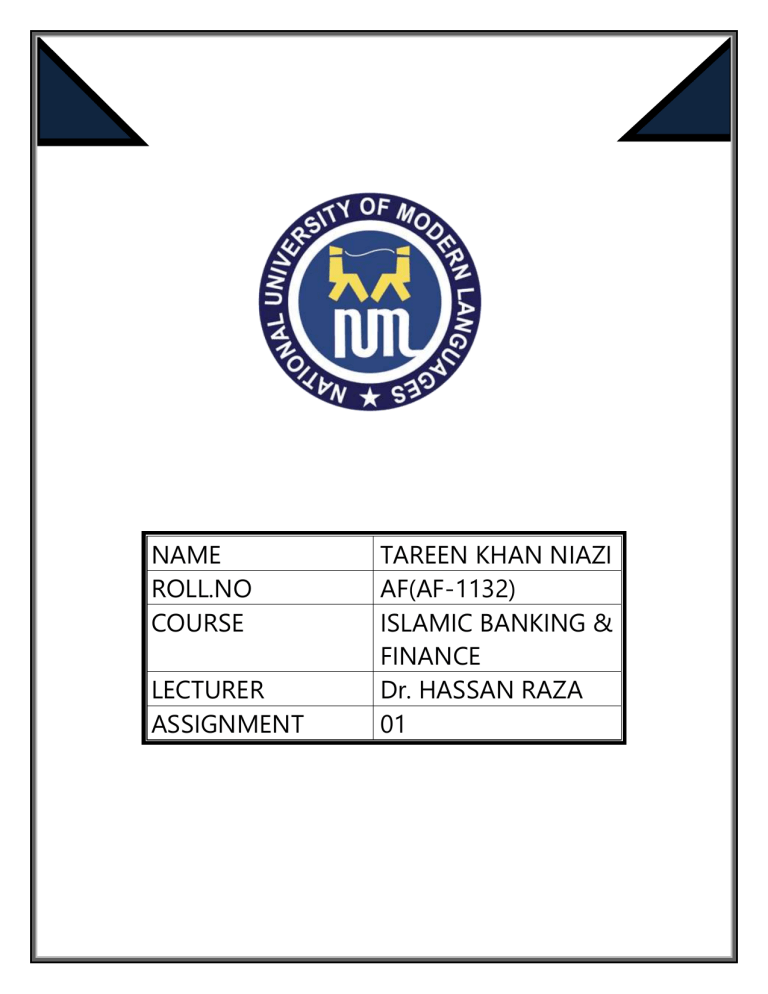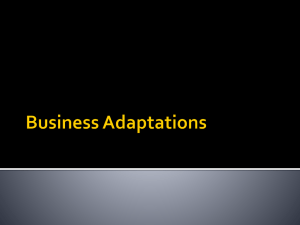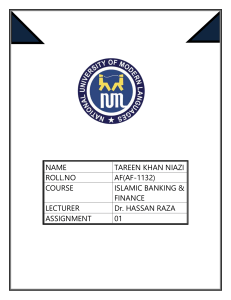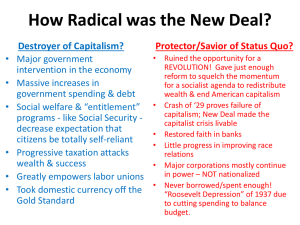
NAME ROLL.NO COURSE LECTURER ASSIGNMENT TAREEN KHAN NIAZI AF(AF-1132) ISLAMIC BANKING & FINANCE Dr. HASSAN RAZA 01 DATED: 04/05/2021 Difference between Economic, Social and Islamic economic system Economic System A system relation between individuals engaged in the production of wealth, distribution, and exchange of wealth and the use of commodities and services is called economic system. There are three major economic systems 1 Capitalism 2 Socialism 3 Islamic Economic system 1 - Capitalism Capitalism is defined as an economic system where the means of production are owned by private individuals. "Means of production" refers to resources including money and other forms of capital. Under a capitalist economy, the economy is substantially run by individuals who own and operate private companies. Decisions over the use of resources are made by the individual or individuals who own the companies. Under capitalism, companies live by the motivation for profit. They exist to generate money. All companies have owners and managers. In small businesses, the owners and managers are generally the same people, but as businesses grow, the owners may hire managers, who may or may not have any ownership stake in the firm. In those cases, the managers are called the owners' "agents." There are 5 basic principles of capitalisism Private ownership Market economy Free enterprise Profit motive Competitive 2 - Socialism Socialism is an economic system where the means of production, such as money and other forms of capital, are owned to some degree by the public (via the state). Under a socialist system, everyone works for wealth that is in turn distributed to everyone. A socialist economic system operates on the premise that what is good for one is good for all and vice versa. Everyone works for their own good and for the good of everyone else. The government decides how wealth is distributed among public institutions. In a theoretical socialist economy, there is a more limited free market than in an archetypal capitalist economy, and thus the taxes are usually higher than in a capitalist system. There are government-run healthcare and educational systems for taxpayers. Socialist systems emphasize more equal distribution of wealth among the people. Principles of socialism Socialism is primarily an economic model, and thus has been an instrument in the labor movement. Community Cooperation Equality Class politics Common ownership Islamic Economic Systems The humanitarian goal of achieving the wellbeing of all members of the human family, to raise the spiritual content of wellbeing and reduce all the symptoms of anomie. Islam accepts the right to private property and maximize profit. But these right are not uncontrolled rather there are some prohibitions The Islamic Economic System is markedly different to capitalistic, socialistic, communistic, and mixed economic systems. Basic principles of capitalism must be changed considerably to fit Islamic economics, but it must be said that some of the foundations are similar in terms of acquisition of wealth. However, it is the application of the wealth and how it ties into production that makes the economic system of Islam unique in the world. Characteristics and Principles of Islamic Economic System: 1. Consumption: Basic consumption is a fundamental part of all economies, including those who follow Islam. People have needs and businesses exist to fulfill them either through goods or services. 2. Government Services: The government serves to keep down activities that are considered non-Islamic in nature such as the black market, gambling, smuggling, and similar activities. In addition, the poor have their basic needs fulfilled in terms of basic life necessities such as food, health, and clothing. Also, there is a requirement for equal opportunity employment and security so that everyone has a chance to work and prosper. 3. No Interest: The economies of the Islamic state should run without interest, which means that the financial system does not use interest as part of the lending procedures when running their banks and financial institutions. 4. Private Property: This is encouraged, although the property itself cannot be used against the interest of the public. The payment of Zakat for the ownership of the property is mandatory. 5. Production: As with capitalistic systems, production is an essential element as it not only addresses the needs of consumers, but also provides employment and opportunity. Under the Islamic Economic System, production is part of the social fabric which makes it vital to society and includes a price system. 6. Wealth: The acquisition of wealth is not discouraged, although it does include a payment of Zakat. It should be noted that the purchase of luxuries is not encouraged either, so the focus of the wealth is more along the lines of the greater good for the family and community. 7. Zakat: This is a major resource for the stability of poor in the Islamic society. It regards as a type of worship, in which a proportion of wealth collected from the rich and given to the poor on an annual basis. This also provides support to the state by reducing number of needy people. Conclusion: The Islamic Economic System is markedly different to capitalistic, socialistic, communistic, and mixed economic systems. Basic principles of capitalism must be changed considerably to fit Islamic economics, but it must be said that some of the foundations are similar in terms of acquisition of wealth. However, it is the application of the wealth and how it ties into production that makes the economic system of Islam unique in the world.





